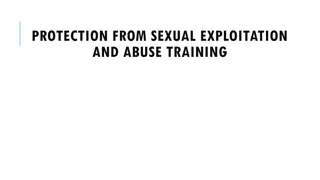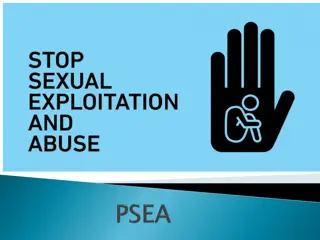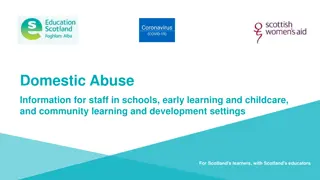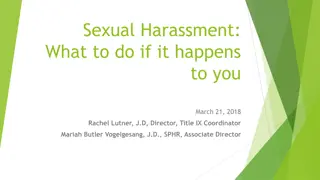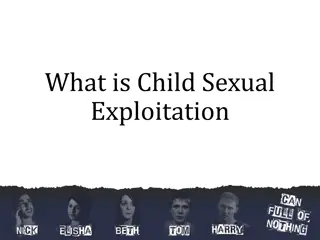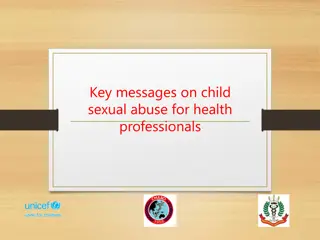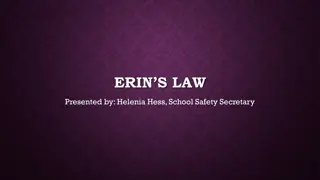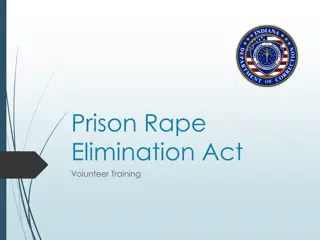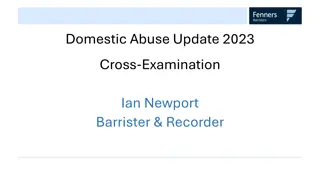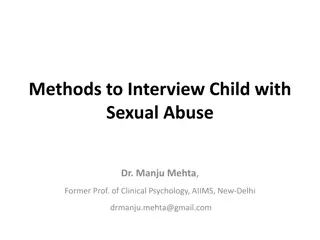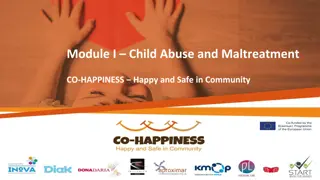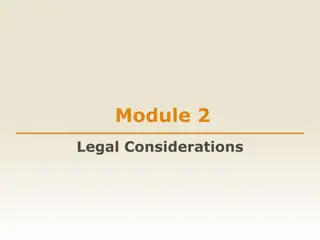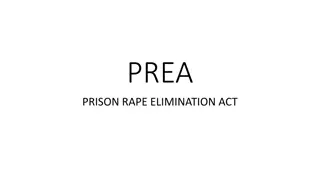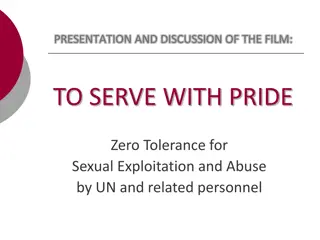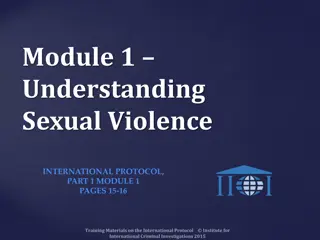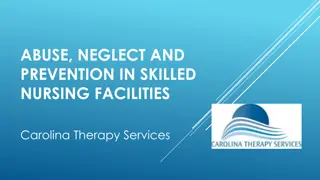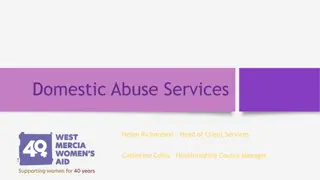Overview of Medical Services in Sexual Abuse Cases in India
Presentation by Kushi Kushalappa at ISPCAN 2018 discusses the strengths and weaknesses of medical services for sexual abuse cases in India. It explores the changes in laws, effective medical services, and the alignment of medical practices with legal guidelines, such as the Protection of Children from Sexual Offences (POCSO) Act 2012. The emphasis is on ensuring therapeutic and medicolegal support, multidisciplinary teamwork, community awareness, and compliance with medical and legal protocols to protect victims of sexual abuse.
Download Presentation

Please find below an Image/Link to download the presentation.
The content on the website is provided AS IS for your information and personal use only. It may not be sold, licensed, or shared on other websites without obtaining consent from the author. Download presentation by click this link. If you encounter any issues during the download, it is possible that the publisher has removed the file from their server.
E N D
Presentation Transcript
Medical services in sexual abuse cases in India: Strengths and weaknesses Presented by Kushi Kushalappa ISPCAN 2018 Working for child safety and gender empowerment since 2001
India facts Population: 1400 million Children: 440 million Districts: 640 Official Languages: 14 Total languages and dialects spoken: 720 Doctors vs population: 1: 1,000 2 Creating Safe Spaces - enfoldindia.org
Change in laws Before 2012 Rape or Sodomy Only peno-vaginal or peno-anal Non penile assault not considered Male perpetrator only After 2012 Any type of contact and noncontact sexual violence Any person perpetrator Heavily dependent on medical opinion Comments on intact hymen Absence of medical injuries considered that sexual assault has not occurred Medical exam shows no injuries Medical exam is often to reassure the victim/family Importance of psychological care Importance of social support 3 Enfold Proactive Health Trust I enfoldindia.org
Effective medical services Therapeutic: Trained doctors and nurses Accessible Medicolegal: Forensic examination on first contact and complete Ensuring dignity of the child Sensitivity Privacy and confidentiality Multidisciplinary team work Social awareness Community awareness programs 4 Creating Safe Spaces - enfoldindia.org
Medical services and the law: 1/3 Protection of Children from Sexual Offences (POCSO) Act 2012 Mandatory reporting of all sexual offences against children Punishment for non reporting Filing police report (FIR) mandatory Setting up of Special Courts Time bound trial and completion Refusal by doctor to treat victim of sexual assault punishable with imprisonment of up to 1 year 5 Creating Safe Spaces - enfoldindia.org
Medical services and the law: 2/3 Medical guidelines (Ministry of Health and Family Welfare) For consent (< 12 years/ > 12 years/ parents) For treatment For collecting forensic evidence For writing a medical opinion Criminal Procedure Code and Indian Penal Code any registered medical practitioner to conduct med exam All hospitals, government & private Free emergency care to sexual assault victims Copy of medical report to child/family 6 Creating Safe Spaces - enfoldindia.org
Medical services and the law: 3/3 Treatment of injuries Screening for sexually transmitted diseases HIV post exposure prophylaxis Emergency contraception (post pubertal girls) MTP Act Right to health If pregnancy is below 20 weeks gestation & child under 12 years, parents consent sufficient. If pregnancy is between 12 to 20 weeks, medical opinion of 2 doctors sufficient for termination If pregnancy beyond 20 weeks, permission required from High Court 7 Creating Safe Spaces - enfoldindia.org
Current situation Existing medical infrastructure Distance to quality medical care in rural India Huge volume of cases at medical facilities Coordination between responders like police, emergency medical services, child protection services Lack of training on nature of samples to be collected based on history of abuse Trials rely heavily on medical opinions and forensic reports; no medical evidence in most cases. 8 Creating Safe Spaces - enfoldindia.org
Challenges: personnel Medical and nursing curriculum needs an upgrade Training in forensic examination inadequate On-going training in interviewing a child and history taking In districts availability of staff 24/7 9 Creating Safe Spaces - enfoldindia.org
Challenges: infrastructure Separate space for interview / examination (emergency ward or labor room inappropriate but used due to lack of space) Sexual assault examination material supply Storage for forensic evidence and transport ( long distances to travel, dependent on police) Forensic Science Laboratories are few 10 Creating Safe Spaces - enfoldindia.org
One stop centers Initiative of Government of India (Ministry of Women and Child Development ) following Nirbhaya case in 2012 In every district across India (640 districts + 20 metropolis) since 2013. located within District government hospital To respond to sexual crimes, domestic violence Convergent model multi-disciplinary response (doctors, police, lawyers, counsellors, case workers) Available round the clock Survivor has access to medical /psycho-social/ legal services under one roof 11 Creating Safe Spaces - enfoldindia.org
Collaborative Child Response Units (CCRUs) Concept by Enfold Trust in 2011 Rolled out in Karnataka State in coordination with ICPS, Department of Women and Child Development, supported by UNICEF Hospital based, multi-disciplinary team approach Single stop to address medical-psycho-social needs of children reporting sexual abuse Convergence of stakeholders, sensitized, trained and informed response, reducing re-traumatization of child and family Challenges: Scaling up the training and monitoring of the functioning of the CCRUs 12 Creating Safe Spaces - enfoldindia.org
Dilaasa center, Mumbai Collaboration between Municipal Corporation of Mumbai and CEHAT Hospital based crisis center, responding to domestic and sexual violence against women and children First Center at Bhabha hospital, Mumbai in 2001 11 Units in and around Mumbai Referrals received through health care system, community, Awareness (IEC) material, ex-clients Providing counselling at the psycho-social and legal level and referring onto trained specialists. Challenges: Has to be included in the budget for sustainability, lack of coordination between Departments 13 Creating Safe Spaces - enfoldindia.org
Way forward Awareness to all people in contact with children: (parents and care givers, staff of educational and residential institutions, daycare facilities, hospitals, mental health professionals) To be aware of dynamics and prevalence of CSA To be able to detect signs and symptoms of CSA To know how to respond to sexual violence and reporting mechanisms Increase number of trained mental health professionals across the country Mandatory personal safety, sexuality and life skills education for children of all ages and caregivers Inclusion of child sexual abuse as a subject in medical, mental health and social work courses 14 Creating Safe Spaces - enfoldindia.org
Thank You Enfold Proactive Health Trust enfoldindia.org +91 99000 94251 Surakshith App: Information, stories on personal safety for children Bal Suraksha App: Information on answering children s questions, and managing CSA Stri Suraksha App: On crimes against women, laws, intervention and healing techniques All Apps in 11 languages, free on android 15











